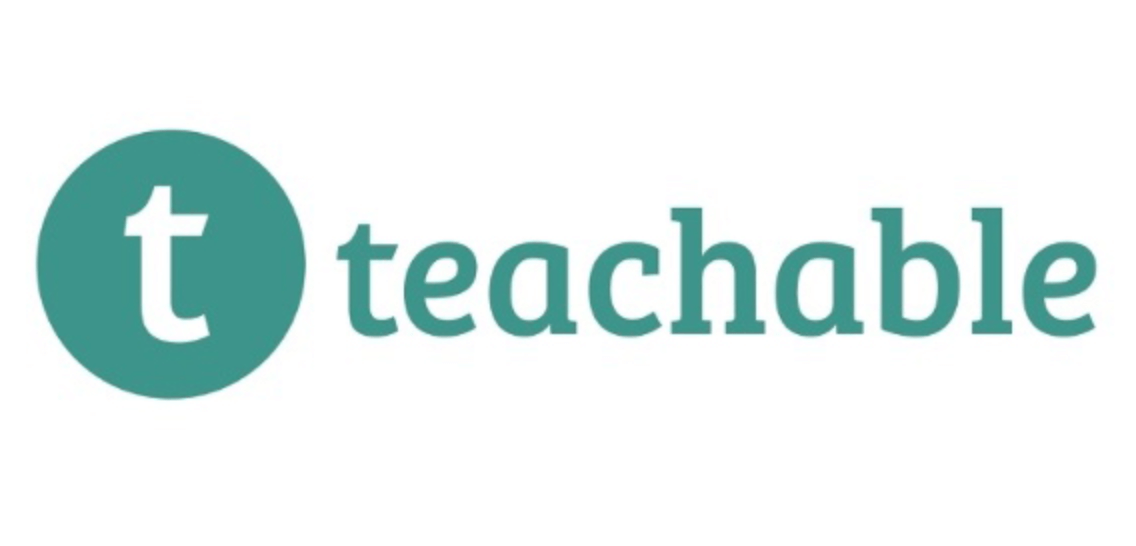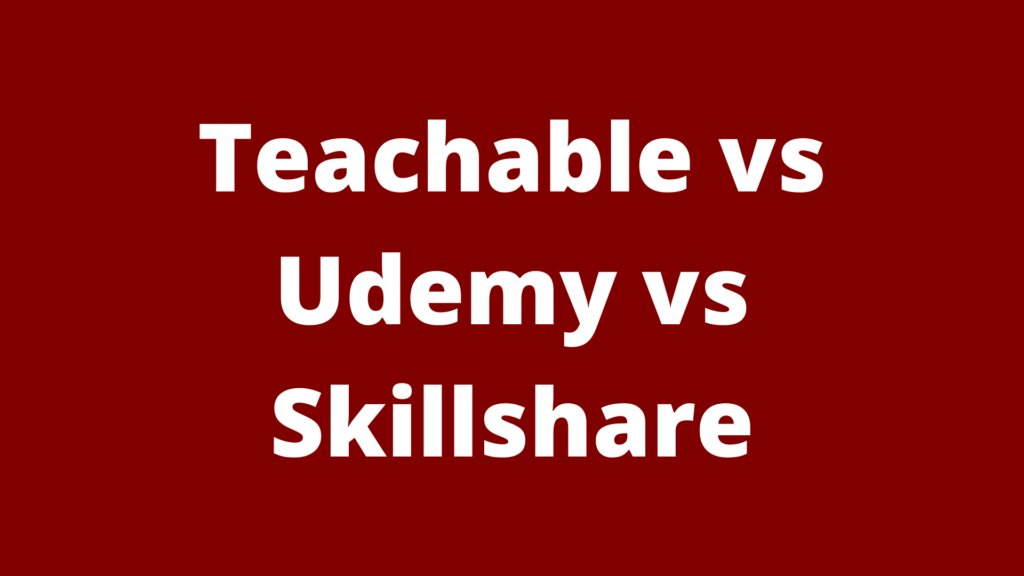As an experienced user of Teachable, Udemy, and Skillshare, I am well-versed in what each platform has to offer. Teachable is a powerful and versatile e-learning platform that enables users to create, market, and sell online courses of any type. Udemy is another popular platform that is widely used by online course creators, offering a range of features to support their success. Lastly, Skillshare is a platform that is more focused on providing educational content, and it is a great option for users who want to share their skills and knowledge with a global audience.
Choosing the right e-learning platform is essential for online course creators, as it will determine how successful they are in reaching their goals. With so many different platforms on the market, it can be difficult to decide which one is right for you. In this article, I will provide a comprehensive comparison of Teachable, Udemy, and Skillshare, allowing you to make an informed decision about which platform is best for your needs.

Course Selection and Variety
Comparing the range and diversity of courses offered on each platform
As an experienced user of Teachable, Udemy, and Skillshare, I have a good understanding of the types of courses available on each platform. Teachable stands out as a platform designed for course creators, offering a wide range of courses across many different topics. It also offers niche courses that are often not found on other platforms. Udemy offers a variety of courses in many different categories and is particularly well-known for its library of affordable courses. Lastly, Skillshare is an online learning community built for creative professionals, providing specialized courses and workshops to help its users refine and sharpen their skills.
Exploring the availability of niche or specialized courses
For those looking for niche or specialized courses, Teachable and Skillshare are the two best choices. Teachable offers a selection of courses in fields such as software development, digital marketing, and photography, while Skillshare has a library of courses in creative disciplines such as graphic design, music production, and illustration. Udemy, on the other hand, is better suited for general courses that cover a wide range of topics.

> > Click Here to Start Teachable for Free < <
Instructor Quality and Expertise
Evaluating the qualifications and expertise of instructors on Teachable, Udemy, and Skillshare
As an experienced user of Teachable, Udemy, and Skillshare, I have noticed one distinct difference between each platform – the instructors and their respective qualifications and expertise. When reviewing courses on each of these platforms, it is important to consider the qualifications and experience of the instructor, as this will likely have an impact on the quality and usefulness of the course.
On Teachable, instructors tend to have experience creating courses and often have a strong understanding of online learning. This is evidenced in the high-quality and comprehensive courses available on the platform. Similarly, instructors on Udemy are often established teachers and professionals who have adapted their knowledge to the online space. Although Udemy does not have a vetting process for instructors, I have found that courses are generally of high quality, with instructors generally experienced in their field. Finally, instructors on Skillshare tend to be creative professionals, many of whom are passionate about sharing their skills and experiences with others. The courses on Skillshare are generally comprehensive and creative, with high production values.
Considering the impact of instructor reputation on course quality
In addition to evaluating the qualifications and expertise of instructors on each platform, it is also important to consider an instructor’s reputation when assessing the quality of their course. Instructors with a well-established reputation in their industry are likely to have a track record of successful courses and satisfied students. This could be indicative of their commitment to providing high-quality content, and it may be a good indication of the value offered by their course. On the other hand, instructors with little experience in their field may not have the same level of expertise or commitment, which can result in lower-quality courses. As such, it is important to consider an instructor’s reputation when selecting a course.

> > Click Here to Start Teachable for Free < <
Course Structure and Learning Experience
Comparing the course structure and format on Teachable, Udemy, and Skillshare
As a seasoned teacher using Teachable, Udemy, and Skillshare, my experience has led me to believe that these platforms each have their own unique features and course structures. Teachable offers an easy-to-use drag-and-drop course builder that allows teachers to customize their course’s structure and format. Additionally, Teachable also provides teachers with built-in assessments and quiz tools, allowing them to create interactive and engaging lessons. Udemy, on the other hand, has a more basic course builder with limited customization options. Additionally, its course structure is standardized, with most courses containing video lectures, quizzes, and practice activities. Lastly, Skillshare’s course builder is tailored specifically for short-form tutorials and videos, with options for an additional project or challenge to encourage students to practice what they have learned.
Exploring the interactivity and engagement features available to learners
When it comes to interactivity and engagement features, each platform offers something different. On Teachable, learners can use the discussion board tool to interact with their teachers and other students. Additionally, teachers can also create private chat rooms for their students, allowing for more in-depth conversations. Udemy also offers a discussion board, but it is not as comprehensive as the one offered on Teachable. Lastly, Skillshare allows students to interact with each other through commenting, liking, and responding to project submissions. Additionally, teachers on Skillshare have the option to create a live “Cohort,” allowing them to share resources and offer feedback to their students in real time.

> > Click Here to Start Teachable for Free < <
Pricing and Cost
Analyzing the pricing models and cost structures of Teachable, Udemy, and Skillshare
When it comes to pricing and cost, Teachable, Udemy, and Skillshare each have different models. In my experience using these platforms, I have come to understand the details of their respective pricing models and cost structures. By providing an overview of each platform’s pricing model and cost structure, I will help readers make an informed decision when choosing a platform for their online content creation and distribution.
Teachable follows a transactional pricing model, with instructors receiving a certain percentage of revenue for each sale. Teachable also offers a range of subscription plans for instructors, with features tailored to course creators, such as affiliate marketing tools and integrations with Zapier.
Udemy utilizes a marketplace pricing model in which instructors are paid according to a set ratio based on the price of the course. Additionally, instructors have access to Udemy’s marketing and discovery features to promote their courses.
Skillshare follows a subscription-based model, with instructors receiving a certain percentage of revenue for each subscription plan. With Skillshare, instructors can take advantage of the platform’s marketing and promotional tools, as well as the ability to embed lessons into other websites.
Highlighting any additional fees or subscription options
In addition to the pricing models outlined above, it is important to note that each platform has additional fees or subscription options that are worth considering.
Teachable’s subscription plans come with processing fees for every sale, while Udemy charges additional fees for its marketing and discovery features.
Skillshare also has additional fees for their subscription plans, as well as a referral program for new students.
Understanding the details of each platform’s pricing models and cost structures is essential for course creators looking to leverage online platforms for their content creation and distribution. While there are no hard and fast rules when it comes to choosing a platform, it is important to consider the features and cost structures of each platform before making a decision.

> > Click Here to Start Teachable for Free < <
Course Accessibility and Lifetime Access
Examining the accessibility options for courses on Teachable, Udemy, and Skillshare
As an experienced user of Teachable, Udemy, and Skillshare, I have gained a significant amount of knowledge regarding the accessibility options for courses on each platform. All three platforms offer varying levels of course accessibility, allowing course creators to control who has access to their content. Teachable, for example, offers a range of visibility settings such as “Published,” “Hidden,” and “Hidden from search,” which can be used to adjust the visibility of courses on the platform. Udemy also offers similar visibility settings, while Skillshare only provides the option to “publish” or “unpublish” a course.
Discussing the concept of lifetime access and its availability on each platform
In addition to offering visibility settings, Teachable, Udemy, and Skillshare all provide the option of lifetime access for enrolled students. Lifetime access ensures that students have ongoing access to a course even after it is completed or removed from the platform. Teachable and Udemy both offer lifetime access to courses published on their platforms, while Skillshare allows course creators to grant lifetime access to select courses. Therefore, when deciding which platform to use for course creation, it is important to consider the specific availability of lifetime access options.

> > Click Here to Start Teachable for Free < <
Community and Student Interaction
Evaluating the opportunities for student engagement and interaction on Teachable, Udemy, and Skillshare
When comparing Teachable, Udemy, and Skillshare, one of the key differences is in the level of student engagement and interaction they offer. I have used each platform extensively and have found that Teachable provides some of the best tools for fostering a vibrant, interactive learning environment. For example, the platform allows instructors to create discussion forums and moderated Q&A sessions, giving students the opportunity to learn from each other and receive direct feedback from the instructor. Additionally, Teachable also offers a feature called “Teachable Spaces,” which is a live virtual classroom where instructors and students can interact in real-time. In comparison, Udemy and Skillshare offer limited features for student engagement and interaction, with most of the learning occurring through video lectures or text-based lessons.
Discussing the availability of discussion forums or peer-to-peer learning features
Teachable stands out as one of the few platforms that offer discussion forums, peer-to-peer learning features, and moderated Q&A sessions. These features are available to all instructors, regardless of the pricing plan they choose, and I have found them to be invaluable for creating an engaging learning environment. Udemy and Skillshare do not have the same level of features, instead focusing more on providing video content and text-based lessons. Additionally, neither platforms offer moderated Q&A sessions or live virtual classrooms, making it more difficult to foster a thriving student community.

> > Click Here to Start Teachable for Free < <
Certification and Accreditation
Exploring the certification and accreditation options offered by Teachable, Udemy, and Skillshare:
As an experienced user of Teachable, Udemy, and Skillshare, I have gained insight into the different certification and accreditation options offered by each platform. Teachable offers instructors the ability to create their own certificates of completion that can be customized to reflect the course content and branding. Udemy also offers certificates of completion, but they are generated and distributed by Udemy and cannot be customized by the instructor. Finally, Skillshare has taken a slightly different approach and does not offer a certificate of completion. Instead, it provides its Premium members with skill badges after completing specific courses.
Considering the value and recognition of certificates obtained from each platform:
When it comes to the value and recognition of the certificates obtained from each platform, Teachable offers the most flexibility and control. I have found that the certificates of completion provided by Teachable are respected and recognized as valid credentials by most employers. Udemy’s certificates are also respected, but they may not carry the same weight as those from Teachable. Additionally, Skillshare’s Skill Badges do not offer the same degree of recognition as certificates, as they are not issued by an accredited institution.

> > Click Here to Start Teachable for Free < <
Support and Resources
Comparing the support channels and resources provided by Teachable, Udemy, and Skillshare
As an experienced Teachable user, I have had positive experiences with the platform’s support channels and resources. Teachable offers a comprehensive knowledge base with articles, tutorials, and FAQs that provide a great source of information for users of all levels. Additionally, the platform provides email support and a live chat feature, allowing me to get fast and accurate responses to my inquiries.
Udemy and Skillshare also provide an impressive range of support channels and resources. Udemy offers a help center with articles, as well as an open forum where users can pose questions and receive answers from experienced members of the community. Skillshare, on the other hand, has a dedicated support team that can be reached via email, as well as a help center with detailed articles and tutorials.
Evaluating the availability of customer support and troubleshooting assistance
When evaluating the availability of customer support and troubleshooting assistance, all three platforms offer reliable and prompt service. From my experience, I have found Teachable’s support team to be very helpful and responsive, with all of my inquiries handled in a timely manner. Similarly, Udemy and Skillshare also provide efficient customer service and offer comprehensive resources to help users find answers to their questions.

> > Click Here to Start Teachable for Free < <
Feedback and Reviews
Examining user reviews and feedback for Teachable, Udemy, and Skillshare
As an experienced user of Teachable, Udemy, and Skillshare, I understand the importance of obtaining feedback and reviews from learners before making a decision on which platform to use. I have conducted my own research and examined user reviews for each platform to understand the level of satisfaction and reputation.
Considering the reputation and satisfaction levels of learners on each platform
When examining user reviews for each platform, I took into consideration several criteria, including ease of use, the breadth of features, the quality of courses, customer support, and value for money. From my research, Teachable is the clear winner in terms of user satisfaction, offering a wide range of features, excellent customer support, and a competitive pricing model. However, each platform has its own strengths and weaknesses, and the best choice ultimately depends on your specific needs and preferences.

> > Click Here to Start Teachable for Free < <
Conclusion
In conclusion, Teachable, Udemy, and Skillshare are all excellent online learning platforms, each with its own unique strengths and weaknesses. Teachable is the most flexible platform with an extensive course creation tool, while Udemy is the largest online learning platform with an extensive library of courses. Skillshare is the most affordable option and offers a variety of monthly and annual membership plans. All three platforms offer monetization capabilities, making it possible to generate income from online courses.
It is important to consider your own individual learning needs and preferences when selecting an e-learning platform. Based on my experience as an experienced user of Teachable, I recommend taking the time to explore the features of each platform in order to determine which one is best for you. Doing so will ensure that you have an enjoyable experience and maximize the success of your online course.
